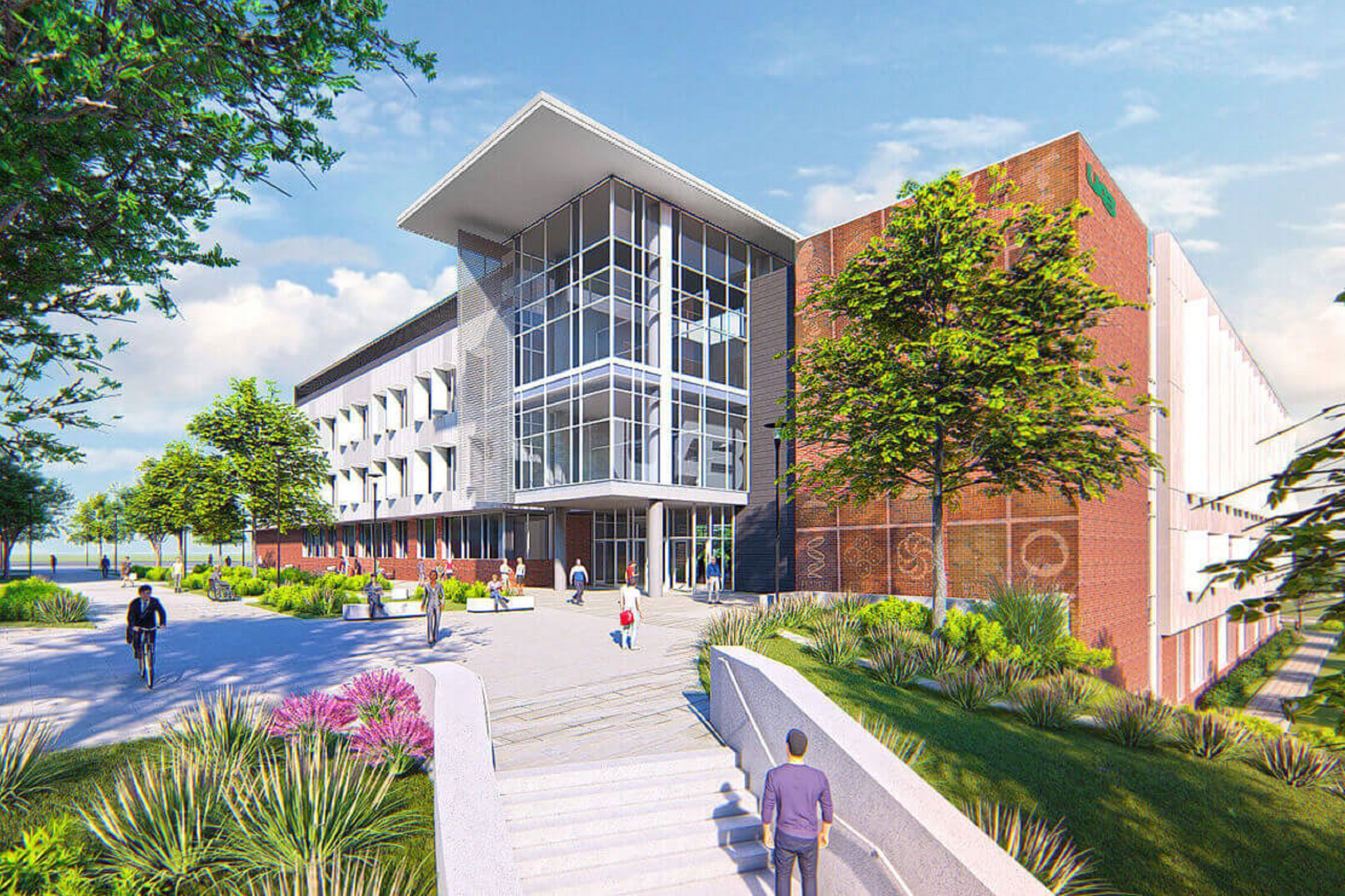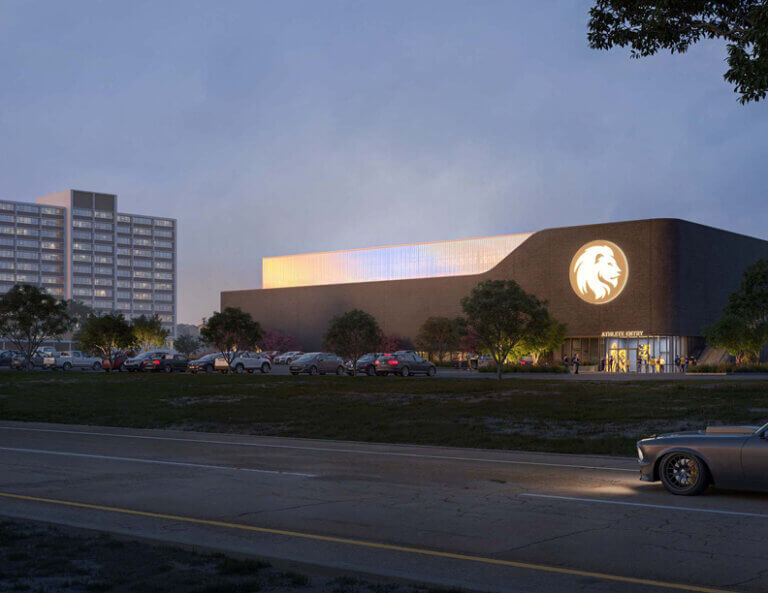
This article originally appeared on Construction Equipment Guide.
Construction crews in Birmingham are building what’s being described as a significant investment in future world-changing research.
The $76 million UAB Science and Engineering Complex will replace the aging Education Building located on 14th Street South between University Boulevard and 10th Avenue South.
“The Science and Engineering Complex will provide the college with opportunities to expand our research in the areas of health and emerging technologies within an inclusive community,” said Dean of the College of Arts and Sciences, Kecia M. Thomas. “In pursuing this work, our community of scholars will continue to invite students from across the country to UAB to participate in our National Science Foundation-funded REU programs, with the hopes of recruiting those students back to UAB for our graduate programs. Also, we believe this research will benefit the economic development landscape of the City of Birmingham and the State of Alabama.”
Thomas explained that the complex and its classrooms and labs will promote collaboration among all who spend time within the building.
“This facility is designed to not simply be a place where students pass through on their way to another class, but where they will feel welcomed to study and meet with their peers and faculty, and where they will feel a sense of belonging. As a college, we aim to elevate collaboration across disciplines, because we know that through collaboration, we can create a thriving interdisciplinary community where innovative research emerges, and students can see themselves as scientists, innovators, problem-solvers and leaders.
“Placing our leading scientists in the same facility will ensure more opportunities for interdisciplinary research that will bolster economic development here in Alabama and across the globe.”
The new construction will provide numerous enhancements to support and grow the STEM instruction and research capabilities at UAB, as well as establish unique environments that will allow the science and engineering disciplines to work and interact in ways that are currently difficult to achieve due to outdated, overburdened or physically remote facilities.
According to Susan Thompson, the director of UAB facilities planning, design and construction, “The overall vision for the complex was to provide a state-of-the-art teaching and research facility for the sciences and engineering where faculty and students have the opportunity to collaborate across disciplines.”
Birmingham-based Hoar Construction, which has performed extensive work at UAB, serves as the general contractor. Construction currently under way on the 138,842-sq.-ft. facility represents the first of three phases. Phase II will house the School of Engineering. Phase III will house the Chemistry Department and balance of Physics, completing the Sciences and Engineering Complex.
Work began in February 2021, with a scheduled completion date of May 2023. UAB Project Manager Jason O’Dell said the biggest challenge for crews has involved obtaining materials, due to the ongoing supply chain issues affecting the entire country. In addition, labor shortages and material pricing volatility also have posed problems.
The project was bid and awarded September 2020, and crews are just now starting construction of the actual facility. The building pad is complete, and the surrounding site work continues as teams are able to backfill the building walls and start the site retaining walls. The project location has benefited the project with the amount of space available for a downtown project and with the rock elevation being as high as it was to limit the depth of the drilled piers.
Mass excavation was limited, due to the existing building footprint. Though the higher rock elevation helped with the depth of the drilled piers, crews have had to remove some rock to install the grade beams and underground utilities. The site contractor has moved approximately 7,000 cu. yds. around the site for the future building.
Concrete work also is taking place, along with the installation of underground utilities and work is progressing through the first-floor concrete structure and slab on grade. The building pad sitework, deep foundations and grade beams have already been completed.
Time spent on the Education Building involved lengthy asbestos abatement, followed by demolition. The structure was brought down in early 2021 by Meredith Environmental Inc.
The abatement of the existing facility began in February and required workers to scaffold the entire exterior of the building to remove the material. Crews had to create an engineered demolition plan to safely take down the structure, using several large track excavators with hydraulic shears and concrete crushers.
A variety of heavy equipment is being used on the project. Right now, crews have a Peiner SK 415 tower crane erected and in use to service the construction of the structure and the setting of the equipment on the roof. Materials required on the job include concrete, brick and metal panels.
Interruptions to campus life will be minimal. The work is contained to the site, with no street closures expected. Sidewalks adjacent to the site will remain open until new hardscape and landscaping goes in during spring of 2023. A new exterior plaza will be constructed between the new building and Mervyn Sterne Library. Work will likely occur over summer 2022 to minimize disruption.
One of the chief concerns in overseeing a project of this nature involves subcontractor coordination. Building the isolation floor for laser rooms will be one of the sensitive parts of construction, while the most time-consuming part of the work involves mechanical, electrical and plumbing. Construction milestones will include topping out, dry-in, mechanical start-up and the complex’s substantial completion.
Goodwyn, Mills & Cawood was selected as the project architect, while Lord Aeck Sargent (LAS) serves as lab and research spaces consultant.
“New, modern building projects like this are monuments to the hard work and support of so many who have made our continued growth possible, and they foreshadow greater things to come,” said UAB President Ray Watts.
“Chemistry connects the basic sciences with all of the applied sciences, including medicine and engineering,” said Richard Dluhy, Department of Chemistry professor and chair. “The foundation of the world’s economy, including advanced materials, energy, nanomaterials, medicines, sensors, biotechnology and genomics all have chemistry at their core. We excel at advancing these scientific frontiers.”
UAB Provost Pam Benoit added, “As our programs in science and engineering continue to grow, it’s important that we provide facilities to support their educational and research efforts. The new complex will enhance facilities to support strategic initiatives around education, research, innovation and economic development, as well as community engagement.”

